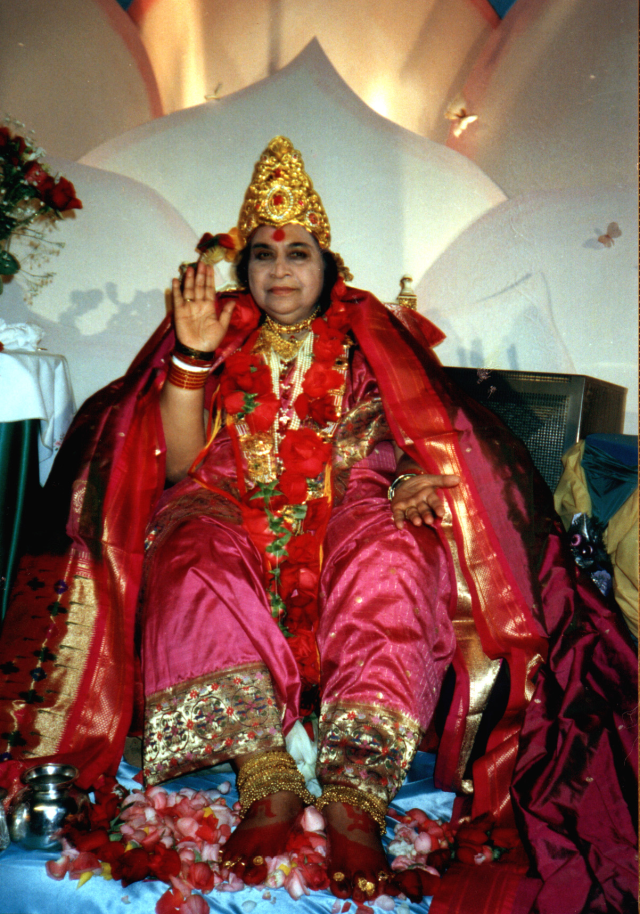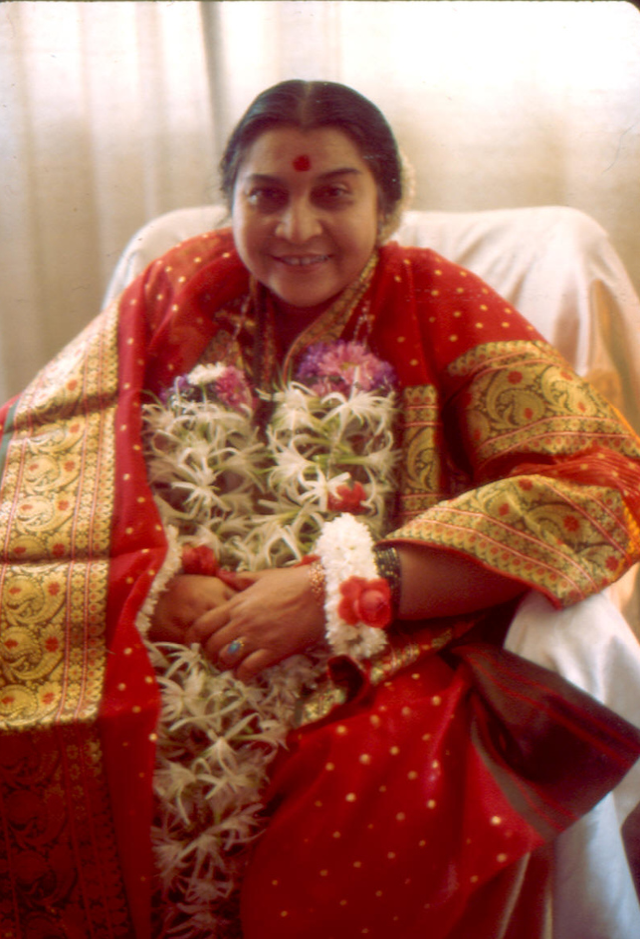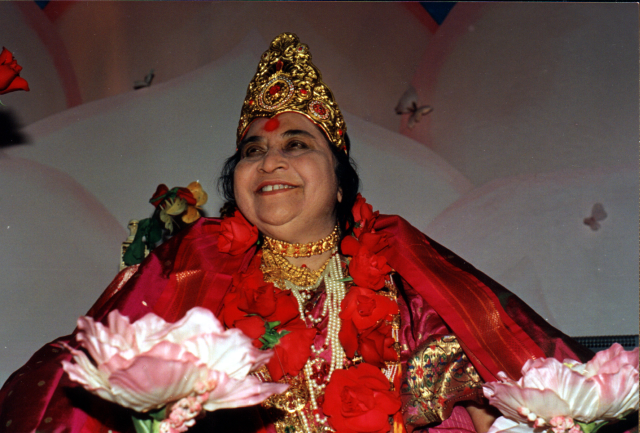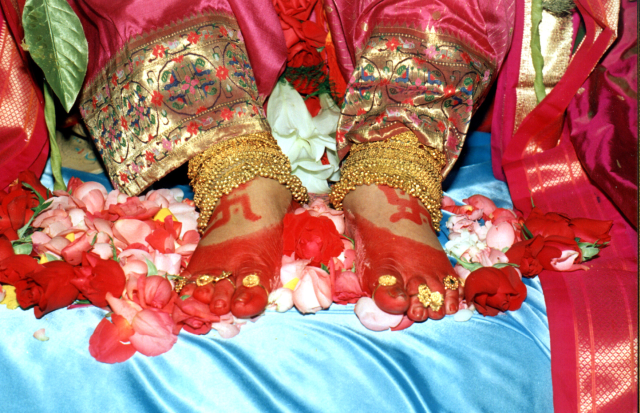2024 Celebrating the Festival of Diwālī: “The first day of Diwālī is called as Dhanatrayodaśhī”

"The significance of Diwālī is spread out in about five days.
......
And they are all together somehow, these five days are all put together. So they have different aspects, but in every aspect there's one common point is that the Goddess plays the main role. Now the first day is the worship of the housewife where you have to buy some sort of a utensil for the kitchen or for the use of the wife or could be a present for the wife, but is said that woman must be respected, but they should be respectable. If they are not respectable how can they be respected."
1992-1025 Diwālī Pūjā (Diwālī Day), Sala Olimpia (Olympia Sports Hall), Timişoara, Timiş, Romania

"The first day of Diwālī is called as Dhanatrayodaśhī: is the thirteenth day of the Moon. Because that day is the first day when Lakṣhmī, the first ... was born on the thirteenth day. That means She was born as a Gṛuhalakṣhmī, as a housewife."
1980-1109 Diwālī Pūjā (Bhāūbīj Day), The Mahālakṣhmī Power, Temple of All Faiths (now demolished, 11c Pond St), Belsize Park, Hampstead, London, UK
Śhrī Lakṣhmī Welcome Song 1987
video
"Diwālī means the, the rows of lights. So, you are going to make this beautiful mansion of God full of Diwālī light. You have entered into the Kingdom of God and you have to enlighten it. So you are the decoration of God on one side, you are the glory of God and also, on the other side you are the guide, guidelines -- you are like the torches, ......"
1981-1027 Talk to Sahaja Yogis (Diwālī Day), Lakṣhmī Principle and Relationship between Men and Women, Āśhram, former Hotel, Bramham Gardens, Earl's Court, Kensington, London, UK
"Dīpawali, dīp means these lights, āwali means the row of lights.
'So I am going to be one of them. And we are going to enlighten the path of the people who want to have Self-realization.'
All these great ideas come to us when we touch our depths. And we feel responsible for all the rest of the humanity."
1979-1020 Diwālī Pūjā (Diwālī Day), Āśhram, 8, Hamilton Road, Dollis Hill, London NW10 1NX, UK
"Since time immemorial, the festival of Diwālī has been celebrated in our country. However, the 'dīpāwali' [arrangement of lamps] of Diwālī started with the beginning of Sahaja Yoga. The lamps that were lit during Diwālī used to get extinguished in some time. The next year, Diwālī would be celebrated by putting oil and a wick in a new lamp. In this manner, every year, new lamps used to be bought. The speciality of the lamp was that at first, it would be put in water and made completely wet and then dried so that the lamp does not absorb the oil in it. It then used to burn for a long time. But we have been celebrating the Diwālī of the heart since Sahaja Yoga started. The heart is the lamp which has the wick and we light it by putting in the oil of love. But before putting in this oil, we have to cleanse the heart completely of all impurities and then decorate it beautifully. When this love is firmly established in our hearts, then the heart does not absorb it. When someone loves you, for example, at first your mother loves you, your father loves you and then some others also love you, you absorb that love within yourself. The love that you get from your husband or your wife, settles down in every pore of your body. However, that love is just restricted to you and others don't get its light.
......
However, when the soft love of Sahaja Yoga is filled in the lamp of the heart, it is no longer restricted to oneself. When it starts burning with the light of the Spirit, it has the ability to light up the entire universe. Such a heart becomes empowered then, to light up the entire universe, to radiate its light throughout the universe, to destroy ignorance in the universe and to spread joy in the whole universe. The same lamp that was broken every year [after Diwālī] now becomes an empowered and a special lamp that does not get extinguished at all. This lamp lights up many other lamps and even those lamps burn for all eternity."
1986-1101 Diwālī Pūjā (Hindi + Marathi) (Diwālī Day), Puṣhpa Maṅgal Karyalaya, Mote Mangal Karyalay Road, Sheth Narayan Das Dugad Chowk, Bibwewadi, Pune, Maharashtra, India

"A Gṛuhalakṣhmī should be a scintillating woman. Her life should be such that the husband should feel that there is something tremendous in the house which will not allow me to take to wrong ways. In the old days, men used to call their wives as 'mālak' [master or owner] and 'sāhib.' There used to be great respect for the wife. How was it so? It was not because the wife used to shout but it was because of her brilliance. It was because of her nobility, composure, generosity, devotion, service and love. A woman has a scintillating character because of these qualities."
1986-1101 Diwālī Pūjā (Hindi + Marathi) (Diwālī Day), Puṣhpa Maṅgal Karyalaya, Mote Mangal Karyalay Road, Sheth Narayan Das Dugad Chowk, Bibwewadi, Pune, Maharashtra, India
"Ahaṃ sākṣhāt Gṛuhalakṣhmī, Ahaṃ sākṣhāt Gṛuhalakṣhmī, Ahaṃ sākṣhāt Gṛuhalakṣhmī, Ahaṃ sākṣhāt Gṛuhalakṣhmī, Ahaṃ sākṣhāt Gṛuhalakṣhmī -- ah!"
1980-0313 Public Program, The Meaning of Sahaja Yoga, Caxton Hall, 10 Caxton Street, Westminster, London, UK
"Gṛuhalakṣhmī is the Deity of the Family, the one who's the Deity of the Family.
Now, any housewife need not be Gṛuhalakṣhmī. She can be a shrew, She can be a horrid thing. The Deity of the Household, if She resides in you, then you are Gṛuhalakṣhmī, otherwise you are not."
1987-1025 Diwālī Pūjā (3rd day after Diwālī Day), Power of Innocence, Meaning of Nine of the Lakṣhmīs, Lecco (50 kms N of Milan on Lake Como), Lombardy, Italy
"The woman has to be a gṛuhalakṣhmī herself, and then she should be worshiped. "Yatra narya[stu] pujyante tatra ramante Devatā." "Where the women are respected and worshiped, there reside all the Deities." But they should be respectable also. If they are not respectable, then the Deities won't reside there. It's a big responsibility on a Gṛuhalakṣhmī to be the respectable, so that all the Deities are happy in the family. And once she is respected, she will try to be respectable also. So, the respect of the gṛuhalakṣhmī is very important."
1985-0818 Śhrī Gṛuhalakṣhmī Pūjā, House, 48 Brompton Square, Knightsbridge, London, UK

"The state of a Gṛuhalakṣhmī should be exactly like a lotus. The lotus is the abode of Gṛuhalakṣhmī. She should be like a lotus that blooms above the water, spreads its fragrance and is the complete support of Śhrī Lakṣhmī."
1986-1101 Diwālī Pūjā (Hindi + Marathi) (Diwālī Day), Puṣhpa Maṅgal Karyalaya, Mote Mangal Karyalay Road, Sheth Narayan Das Dugad Chowk, Bibwewadi, Pune, Maharashtra, India
Jaya kamal‛āsani sat-gati-dāyini, gñyāna vikāsini gāna-maye,
Victory to the lotus-seated Giver of happiness, You are abundant knowledge and sacred songs,
Anudinam-archita kumkuma dhūsara, bhūṣhita vāsita vādya-nute,
Worshipped daily, decorated with kum-kum and sandalwood and praised with music
Kanaka dharā stuti vaibhava vandita, śhañkara deśhika mānya-pade,
Wearing gold, praised with verses in Your glory, Lord Shiva is to be found at Your venerable Feet
Jaya jaya he Madhu-sūdana kāmini; Vijaya-lakṣhmi sadā pālaya-mām
Victory to the loving consort of Shrī Viṣhṇu, O Giver of Victory, protect me always.

"Today is a great day of Diwālī. That means today is the great day of [unclear putting up] lights of your heart together to make a greater light for the world to move in a proper direction. It’s a day of great joy, and those who join in this, are spreading also great joy.
......
Today is a day of spreading love, light of love so that everybody feels enlightened and happy and forgets these petty problems."
2003-1109 Diwālī Pūjā (16th day after Diwālī Day), The Need for Sincerity, Holiday Inn Express and Suites, 1080 Navigator Drive, Ventura, CA, U.S.A.
Auṃ Twameva sākṣhāt Śhrī Gṛuhalakshmī sākshāt Śhrī Ādi Śhakti Mātājī Śhrī Nirmalā Devyai namo namaḥ
O Divine Mother, You are verily the ideal housewife. Salutations to You!
Pavan Utsav ayya re
video
Hasat Ali
video
Kanakadhara Stotram
video
Aṣhṭa Lakṣhmī Storam
video
Jai Śhrī Mātājī!
On behalf of the festivity team!